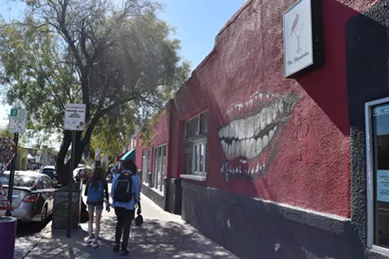Tuesday, February 20, 2018
Fourth Avenue and Future of Localism in Tucson

Danyelle Khmara
The ol' Flycatcher bar, on the corner of Sixth Street and Fourth Avenue, may soon be a seven-story apartment complex.
The Flycatcher nightclub may be demolished for seven-story apartments and retail space under contract with Education Realty Trust Inc., or EdR, a student-housing development company out of Memphis. The area that EdR has under contract stretches west from the corner of Fourth Avenue and Sixth Street to Fifth Avenue. The development is in the Infill Incentive District (IID) focused on creating more urban planning designs and offering development incentives and flexibility. With this development, EdR is reported to be avoiding the “group dwelling” designation for student housing and instead using the designation “multifamily dwelling” by renting units by room rather than bed and avoiding parking, loading, and landscaping standards.
Local First Arizona has many concerns about a development of this nature despite the supposed economic development benefits that will be touted. We have seen this story unfold before in the City of Tempe. What may seem like simply one new development different than the rest of Fourth Avenue can easily become a trend and the new norm. As Tempe invited more chains to their thriving downtown decades ago, the sales tax revenue dropped steadily for 27 months. Thus, the history and culture of localism on Fourth Avenue must continue to be supported and strengthened to prevent similar trends and norms here in Tucson. Tucsonans and visitors alike have embraced the avenue because of its makeup of unique local businesses, making it a top destination and driving a powerful local economy for decades.
Local ownership is critical to the prosperity of our local communities. By creating a structure of policies and processes for local businesses to be supported, more revenue will stay in Tucson. Local ownership is supported by models of economic development, including reducing economic leakage, avoiding ‘big-whale’ strategies, creating diverse and resilient economies by leveraging local talent, focusing on retention and expansion, tourism and events, and establishing a unique position in the market through these models combined.
What can the community do to address this development that is jeopardizing local ownership? Local First Arizona recommends advocating for the following action steps:
• City Council can review its current policies and any financial incentives related to development that they may approve for this out-of-state company and decide whether such a project fits with the character and consumer demands of this community.
• Council members can review tying current financial incentives to criteria for local developers who understand the area and support options for local businesses as property values increase. The developers are planning to keep 7,000 to 8,000 square-feet of retail, and have expressed an openness to local retailers. However, more must be done to ensure that local businesses can actually fill that retail space and are supported.
• Planning and zoning rules should be reviewed to determine what can be improved to support local businesses based on this development and for any future developments.
• Community stakeholder forums can explore options on local ownership such as financial incentives criteria tied to the local economy. Fourth Avenue Merchants Association is planning to work with Local First Arizona on a local ownership stakeholder forum focused on this current development and future developments.
The importance of local ownership cannot be understated in this urgent situation. We are facing this dilemma due to an out-of-state developer designing a project that is far from the norms and values of the heritage of local businesses on Historic Fourth Avenue. At the very least, the design of this building should be substantially vetted with stakeholders of the avenue to ensure cohesiveness with the sense of place that Fourth Avenue provides.
Much more can be done to strengthen local ownership to protect against future developments of this nature. There are a number of examples to review regarding best practices for supporting local businesses and strengthening local ownership, including the following:
• Residents of Palm Beach, Florida, converted their main commercial district into a “town-serving zone.” The zone caps its stores at 2,000 square feet and defines “town-serving” as follows: “establishments principally oriented to serving the needs of Town Persons which would not substantially rely upon the patronage of persons not defined as Town Persons. Town-serving establishments, by definition, would typically contain 2,000 or less square feet of interior Gross Leasable Area (GLA) and would not engage in advertising designed to attract other than Town Persons.”
• In Jersey City, N.J., the city council approved restrictions on chain stores in 2015 to protect the character of downtown neighborhoods. The law restricts chain stores from taking up more than 30 percent of ground-floor commercial space in any one lot in several non-contiguous areas downtown.
• In San Francisco, California, formula retail stores and restaurants are considered conditional uses throughout most of the city and must be approved by the Planning Commission on a case-by-case basis, with the policy crafted based on research and guidance from the Institute for Local Self-Reliance to formulate its policy. San Francisco’s policy also requires that large-scale formula businesses, defined as those over 20,000 square feet, except grocery stores, undergo an economic impact analysis. The results are then reviewed by the Planning Commission in deciding whether to grant the applicant a permit based on factors such as job creation, fiscal impacts, and leakage.
• In Seattle, Washington, the Mayor's Commercial Affordability Advisory Committee created a list of recommendations intended to support small businesses in a climate of rapidly changing market forces based on focus groups, one-on-one-interviews, case studies and best practice data gathered from other municipalities to address and answer these questions. The committee defined legacy businesses as "a type of small business that supports community identity and stability through its long tenure."
There are many best practices to understand and potentially apply here in Tucson. What is needed now is the resolve to review all of the existing options and creative new options that can be taken to support locally-owned independent businesses on Fourth Avenue and throughout Tucson now and moving forward. We must think critically about how this unique avenue of our community would change due to an outside developer and create larger trends and norms that would be a barrier to local ownership. This can instead be the opportunity to think differently about economic development and create a system of local ownership for local businesses to sustain and thrive.
Michael Peel is the Southern Arizona director of Local First Arizona. Get involved as a member or volunteer of LFA by signing up at www.localfirstaz.com.











